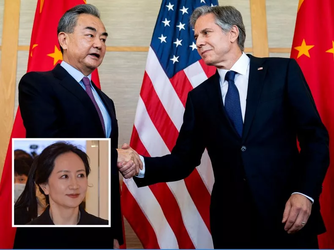When the top diplomats of China and the United States held their latest meeting over the weekend, Beijing passed along four lists of items that it wanted Washington to address in order to improve the present strained relations between the world's top two powers.
The exchange, first reported in a statement published Saturday by the Chinese Foreign Ministry, was confirmed Monday during a press briefing held by spokesperson Wang Wenbin, who offered some more insight into the contents of these demands conveyed by Chinese Foreign Minister Wang Yi to U.S. Secretary of State Antony Blinken.
"They include the updated list of U.S. wrongdoings that must stop, and the updated list of key individual cases that the U.S. must resolve, which were first presented to the U.S. side at last year's meeting in Tianjin," Wang Wenbin told reporters. "The other two lists are the list of Acts in the 117th Congress of high concern to China and the list of cooperation proposals in eight areas including climate change, public health and people-to-people exchange."

In this combinatiuon image, US Secretary of State Antony Blinken (R) shakes hands with China's Foreign Minister Wang Yi during a meeting in Nusa Dua on the Indonesian resort island of Bali on July 9, 2022 and Huawei chief financial officer Meng Wanzhou (Inset) leaves after the Huawei 2021 Annual Report Press Conference in Shenzhen, in China's southern Guangdong province on March 28, 2022.
Summarizing the details of these lists presented to President Joe Biden's administration on behalf of Chinese President Xi Jinping, Wang Wenbin said they "once again demonstrate China's serious position that the U.S. must stop exercising containment and suppression, stop interfering in China's internal affairs, and stop undermining China's sovereignty, security and development interests."
"The lists also reflect China's constructive attitude about conducting practical cooperation with the U.S. on the basis of mutual respect, equality and mutual benefits," he added. "We hope the U.S. side can take China's lists seriously, and take real actions to fulfill the commitments made by President Biden and the U.S. government."
Blinken did not address the four lists directly when speaking to reporters following his talks with Wang on Saturday, but he did say the two sides discussed areas "where more cooperation between our countries should be possible, including on the climate crisis, food security, global health, counter-narcotics," as well as "areas of disagreement and ways to manage and reduce risks," including on tensions over Taiwan, human rights concerns in Hong Kong, Xinjiang and Tibet, territorial disputes in the South China Sea and the status of U.S. citizens unable to leave China.
Blinken added that "despite the complexities of our relationship," he could "say with some confidence" that both parties found the talks "useful and constructive."
Article Link
Archive
The exchange, first reported in a statement published Saturday by the Chinese Foreign Ministry, was confirmed Monday during a press briefing held by spokesperson Wang Wenbin, who offered some more insight into the contents of these demands conveyed by Chinese Foreign Minister Wang Yi to U.S. Secretary of State Antony Blinken.
"They include the updated list of U.S. wrongdoings that must stop, and the updated list of key individual cases that the U.S. must resolve, which were first presented to the U.S. side at last year's meeting in Tianjin," Wang Wenbin told reporters. "The other two lists are the list of Acts in the 117th Congress of high concern to China and the list of cooperation proposals in eight areas including climate change, public health and people-to-people exchange."

In this combinatiuon image, US Secretary of State Antony Blinken (R) shakes hands with China's Foreign Minister Wang Yi during a meeting in Nusa Dua on the Indonesian resort island of Bali on July 9, 2022 and Huawei chief financial officer Meng Wanzhou (Inset) leaves after the Huawei 2021 Annual Report Press Conference in Shenzhen, in China's southern Guangdong province on March 28, 2022.
Summarizing the details of these lists presented to President Joe Biden's administration on behalf of Chinese President Xi Jinping, Wang Wenbin said they "once again demonstrate China's serious position that the U.S. must stop exercising containment and suppression, stop interfering in China's internal affairs, and stop undermining China's sovereignty, security and development interests."
"The lists also reflect China's constructive attitude about conducting practical cooperation with the U.S. on the basis of mutual respect, equality and mutual benefits," he added. "We hope the U.S. side can take China's lists seriously, and take real actions to fulfill the commitments made by President Biden and the U.S. government."
Blinken did not address the four lists directly when speaking to reporters following his talks with Wang on Saturday, but he did say the two sides discussed areas "where more cooperation between our countries should be possible, including on the climate crisis, food security, global health, counter-narcotics," as well as "areas of disagreement and ways to manage and reduce risks," including on tensions over Taiwan, human rights concerns in Hong Kong, Xinjiang and Tibet, territorial disputes in the South China Sea and the status of U.S. citizens unable to leave China.
Blinken added that "despite the complexities of our relationship," he could "say with some confidence" that both parties found the talks "useful and constructive."
Article Link
Archive